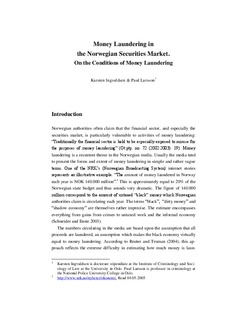| dc.contributor.author | Ingvaldsen, Karsten Olaf F. | |
| dc.contributor.author | Larsson, Paul | |
| dc.date.accessioned | 2011-05-12T07:09:18Z | |
| dc.date.available | 2011-05-12T07:09:18Z | |
| dc.date.issued | 2009 | |
| dc.identifier.citation | Ingvaldsen, Karsten Olaf F & Larsson, Paul (2009). Money laundering in the norwegian securities market: on the conditions of money laundering. I: Petrus C., van Duyne... [et al.] (ed.), Crime, money and criminal mobility in Europe. (s. 257-309). Nijmegen : Wolf Legal. | en_US |
| dc.identifier.isbn | 978-90-5850-477-7 | |
| dc.identifier.uri | http://hdl.handle.net/11250/174968 | |
| dc.description | This is the final text version of the article, it may contain minor differences from the publisher's pdf version. | en_US |
| dc.description.abstract | Norwegian authorities often claim that the financial sector, and especially the securities market, is particularly vulnerable to activities of money laundering. Money laundering is a recurrent theme in the Norwegian media. Usually the media tend to present the forms and extent of money laundering in simple and rather vague terms. The numbers circulating in the media are based upon the assumption that all proceeds are laundered, an assumption which makes the black economy virtually equal to money laundering. Our starting point is that every discussion on the forms and extent of money laundering must be based upon concrete empirical analyses of the conditions of money laundering and on a precise definition of this concept. For this reasons it is relevant to analyse two conditions: who has the possibility and the need to launder money. Control is of major importance in this connection. Money laundering is a crime without a specific victim. Money laundering per se does not create new victims apart from those connected to the predicate offences. There is no prejudiced party that will have an interest to report the offence of money laundering to the police. Prevention and uncovering of laundering or rather, conveying suspicions thereof, are completely left to the regulating system of banks, financial institutions and all other entities obliged to report unusual or suspicious transactions. Furthermore, there are many economic sectors which offer opportunities for laundering: restaurants and pubs, real estate, or gambling. There is also concern about crime-money being laundered in the higher financial echelons: the securities markets. If that concern is correct we have to ask who really has the opportunity to launder money in the securities market, is this a way of laundering which is available to everybody? | en_US |
| dc.language.iso | eng | en_US |
| dc.publisher | Wolf Legal Publishers | en_US |
| dc.subject | økonomisk kriminalitet | en_US |
| dc.subject | hvitvasking | en_US |
| dc.subject | organisert kriminalitet | en_US |
| dc.subject | korrupsjon | en_US |
| dc.subject | svindel | en_US |
| dc.subject | Norge | en_US |
| dc.subject | economic crime | en_US |
| dc.subject | money laundering | en_US |
| dc.subject | organised crime | en_US |
| dc.subject | corruption | en_US |
| dc.subject | fraud | |
| dc.subject | Norway | |
| dc.title | Money laundering in the norwegian securities market: on the conditions of money laundering | en_US |
| dc.type | Chapter | en_US |
| dc.type | Peer reviewed | |
| dc.source.pagenumber | 275-309 | en_US |
